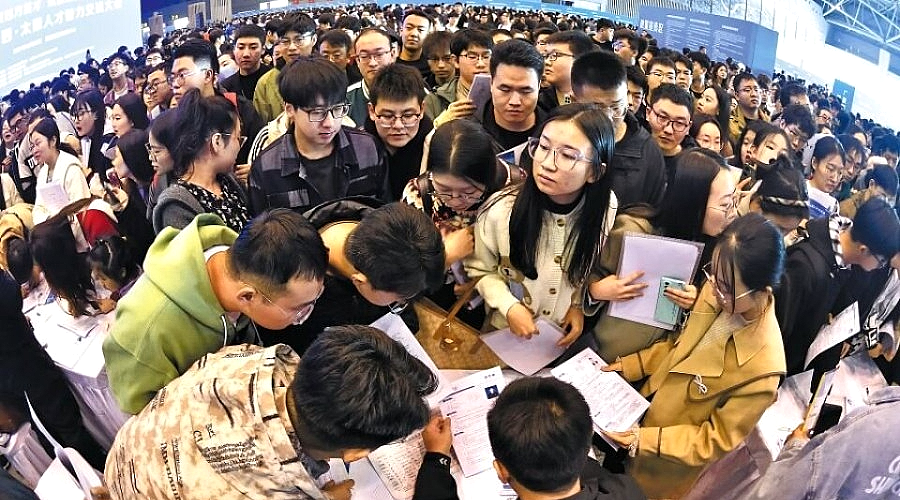Chinese Premier Li Qiang deliveres his annual work report at the opening session of the National People’s Congress on Tuesday
GREG BAKER
Text size
Chinese Premier Li Qiang delivered the country’s annual government work report on Tuesday, laying out the ruling Communist Party’s key aims for the year ahead.
Here are some of the report’s highlights:
China has set an economic growth target of “around five percent” in 2024, the same goal as last year but far lower than previous decades.
Beijing has struggled to sustain its rebound from the Covid-19 pandemic as a property sector crisis and flagging consumption weigh on growth.
Li told the gathered CCP cadres, including President Xi Jinping, that the country would seek “steady growth” in consumer spending and “defuse risks in real estate (and) local government debt”.
Beijing will also remove more barriers to foreign investment and “appropriately cut import tariffs on advanced technology and equipment”, Li said at Beijing’s Great Hall of the People.
The Chinese economy expanded by 5.2 percent in 2023, according to official statistics — one of its lowest rates in years.
China’s military spending will rise 7.2 percent to 1.665 trillion yuan ($231.4 billion) this year, according to a separate budget report.
The figure is broadly in line with the announced increases in previous annual work reports.
However, some Western analysts believe Beijing ploughs a significant amount of extra money into its armed forces without officially disclosing it.
The spending increase comes as China’s relations with several neighbouring states show signs of strain.
Tensions have simmered in recent years as Beijing has sought to assert its territorial claims over Taiwan and disputed areas in the South China Sea.
On Taiwan, Li said China would “resolutely oppose separatist activities” aimed at the self-ruled island’s independence and “external interference”.
He said Beijing would seek the “peaceful development” of ties with Taiwan but did not commit to “peaceful unification” as mentioned in previous years.
China claims democratic Taiwan as part of its territory and has refused to rule out using force to bring it under its control one day.
It has maintained a hard line towards Taiwan’s ruling party since its candidate Lai Ching-te won the island’s presidential election in January.
It has branded the president-elect a “separatist” and sent warplanes and naval vessels around the island on a near-daily basis.
Relations with Taipei sank further last month when two Chinese sailors died in an incident involving the Taiwanese coast guard near the Taipei-administered island of Kinmen.
The work report said Beijing will “strengthen measures to promote the employment of young people”, an issue at the heart of China’s economic malaise.
Joblessness among people aged between 16 and 24 has spiked since the pandemic and become a politically sensitive topic for the Communist Party.
The national statistics bureau stopped publishing the youth unemployment rate for several months from last summer as the figure soared above 20 percent.
It began publishing the rate again in December after adjusting its calculation methods, with around 15 percent of young people recorded as being out of a job that month.
Tuesday’s report said Beijing would “apply a combination of measures to ensure stability in employment and promote income growth”.
Nationwide, it targeted over 12 million new urban jobs and a surveyed urban unemployment rate across all working demographics of “around 5.5 percent”.
It also promised better healthcare and social security services and a “proactive national strategy” in response to the rapid ageing of the country’s population.
Li said China would stick to its “independent foreign policy of peace and… peaceful development”.
But he added that Beijing would “remain firm in opposing all hegemonic, high-handed and bullying acts”, without referring to any countries by name.
China has clashed with the United States and other Western powers in recent years over technology, trade, human rights and other issues.
Its foreign ministry has previously used such language in response to acts by Washington that China deems a constraint on its development.













